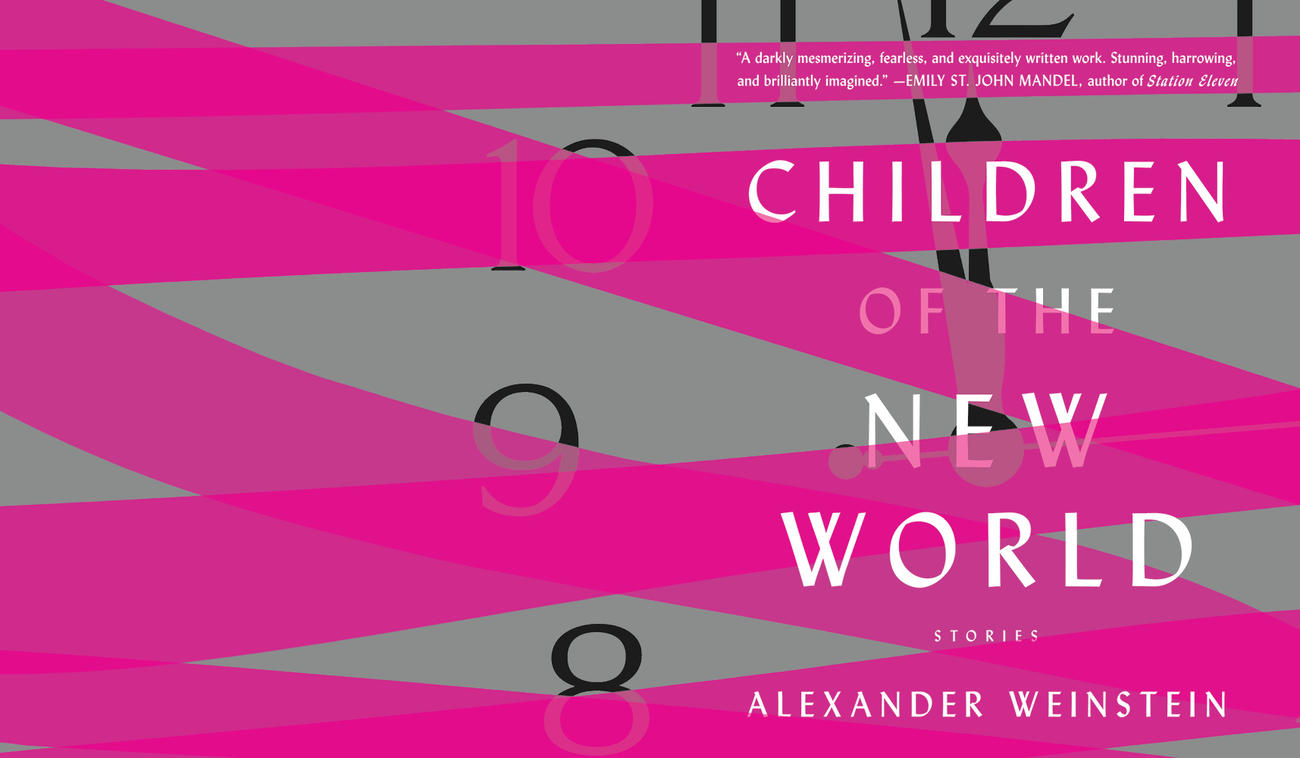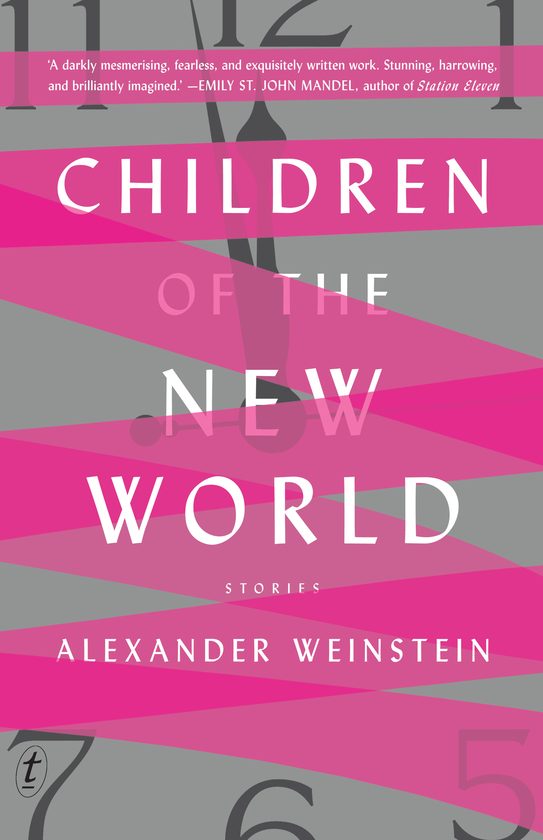
Alexander Weinstein has written a dark debut collection of short stories depicting a technological future gone awry. Children of the New World is one part Black Mirror, two parts J. G. Ballard and altogether twisted. We asked Alexander about his inspirations, his thoughts on speculative fiction and about the peculiar kinds of technologies he’s learned about while creating his collection of dystopian stories.
Children of the New World imagines a near future of social-media implants and post-revolution discord. Given our growing dependence on new technologies, how closely do you think your stories might come to reality?
I often joke that in ten to twenty years my collection will no longer read as speculative fiction but rather as pastoral realism! It’s pretty scary to see how many of my dystopian technologies and settings are becoming reality. I wrote the stories with the hope that they would function as warnings, but already I’m hearing reports of contact-lens screens, temporary digital tattoos which will allow us to carry a computer interface on our bodies and virtual drugs. For example, in my stories ‘Migration’ and ‘Children of the New World’, people are having fully virtual online sex with other people through their computers. Recently I was told about new developments in teledildonics (yes, it’s what it sounds like). These are virtually enabled sex toys which sync up with pornography—so that what happens on the screen replicates through the sex toys. I predict that within the decade, this technology will become standard, and we’ll start having a kind of fully immersive online dating/sex app. A Facebook of sex, where users will log on and have STD-free virtual sex with nameless users. I sure hope my predictions will be proven wrong!
As for environmental catastrophes, it seems that reality has already surpassed my dystopian visions. Fracking is making water flammable, coal companies are busy with mountain top removal in the Appalachian Mountains, the governor in Michigan has knowingly poisoned the families of Flint, and the list goes on. So, in many ways, my stories are already a kind of realism. My hope is that we’ll start to reverse this trend.
A few of your stories look not just at technological advancements in the near future, but also the way these impact various relationships—family, romantic and others. What sparked your interest in this particular aspect of the future?
I’m deeply interested in our capacity for love, compassion and kindness. As a father, I find that one of the biggest joys in my life comes from parenthood—and so this began showing up throughout many of my stories. I didn’t set out to write about father–son relationships, but they naturally arose within the work.
Similarly, I find that romantic love appears in my stories because I’m often dealing with aspects of love within my own life. For example, in the story ‘The Cartographers’, I wanted to explore how we end up creating memories with those we love. I explore this through Adam Woods, and the company he works for, which produces virtual memories that people can beam into their consciousness. When I wrote the story, I’d just gone through a breakup with a woman I’d loved dearly. Without this other person in my life, the memories we’d shared often felt like phantoms. Who was this person I once loved? Did she still really exist? The answer, on a metaphysical level, was that this person didn’t still exist. She’d gone on to become a different person, an individual with new hopes and dreams which no longer involved me. And yet, there were still the memories of jokes we shared, replete with punchlines that no one else would ever understand. These are the residues of our ex-lovers, unseen by anyone else, still shared across vast distances with people we may never speak to again.
This became the narrative, which drove the story, of Cynthia and the narrator who still loves her, even in her absence. And this idea, of falling in love with other people’s projections (à la beamed memories), is akin to how we fall in love with the real memories we create with others.
Why do you choose to write in the short story form?
It’s how the tales come to me. While I’m not against the novel form (I love reading novels), I find that I tend to think in short stories. I like the ability to capture a single conflict at its breaking point within a short period of time—which the short story form is particularly suited for. It also allows me to move more fluidly between characters, settings, voices, and styles. I can write a magical realist story and then move on to a more dystopian piece, or a formalist piece, or a fairy tale, etc. I like this fluidity, which works well for my creativity, as opposed to being stuck for the long haul within the constraints of novel writing.
What sort of research was involved in writing Children of the New World?
Very little! Most of the stories come from my own bumbling attempts at using new technology. For example, the robot that malfunctions in ‘Saying Goodbye to Yang’ came directly from my laptop crashing. At the time I had a great deal of creative work on the computer, and I was emotionally distraught at my computer breaking down. This then led to the character of Yang, the robot boy, whose loss precipitates the emotional turmoil of the family who has come to love him.
That said, since my friends and family know I write speculative tech stories, I often get emails with links to very frightening advances in technology. This is how I know about eye-screen contact lenses, temporary tattoos, and the wild world of teledildonics.
Why do you write speculative fiction?
Imagined settings allow me to play with metaphor much more readily than realism does. The most fantastical of my settings in the collection might well be the story ‘Ice Age’, where the world has been covered in ice, and the characters are living in igloos (with one rich guy living in a double-decker igloo and burning up all the wood). I was writing this during the Occupy Wall Street movement, and so this ice world seemed to be a great metaphor through which I could explore class and income inequality.
In the second book I’m working on, The Lost Traveler’s Tour Guide, I explore the metaphors of imaginary worlds even more deeply. The book takes the form of a fictional tour guide which describes fantastical destinations—hotels of love, museums of heartbreak, bakeries of joy and cities of solitude. The destinations are imaginary but largely autobiographical—I’ve experienced cities of love, heartbreak and joy throughout my life. I find that the best way I can gain access to the nuances of these universal emotions is by creating landscapes wherein the emotion itself gets to be the geography.
There’s also something important that happens for me as a writer when I work with imaginary worlds. By writing about these landscapes, I get to be a traveller within my own stories. I no longer know the terrain that I find myself writing about, and by venturing into these fantastical settings, I’m forced to let go of my control of plot. The moment this happens, the story begins to lead me in unexpected directions—often ones wherein the dreams of my subconscious begin to play out. The subsequent metaphors the stories reveal are quite often ones I wouldn’t have come up with through my rational/plotting mind. So by opening the doorway to speculative worlds, I get to discover tales I never knew existed.
What do you make of comments that your work looks like science fiction, but reads like literary fiction?
I think it’s accurate. Since I don’t get into the actual science behind the technology, my stories don’t fall into the technical category of sci-fi. Scientific believability is often a badge of honor for sci-fi writers—deservedly so—and because of this, I feel that my work is speculative rather than scientific. But my focus on the very human dramas of life (the struggle to love well, to be good parents, to navigate relationships) shares a great deal with the tradition of literary realism.
While my stories do dip into the realm of sci-fi, they’re also very traditional. I love the works of Russian writers like Chekhov and Tolstoy, and their ability to portray our human struggles and joys. And I love the Russian absurdists—Gogol, Kharms and Bulgakov. Even within Russian experimentalism, there’s a lineage of traditional narrative, conflict and character development, which I find vital to my storytelling. It’s of course not the only way to tell a story, and I really admire the experimentalists who challenge traditional narrative—writers like Ishmael Reed, Tatyana Tolstaya, Donald Barthelme, George Saunders, Michael Martone and many others.
So the genre labels of speculative fiction and slipstream work well for covering both of these terrains. All that said, I’m not a huge fan of separating literature into genres—I’m much more for letting all genres (sci-fi, detective, mystery, adventure, humor, absurdity, realism) come under the heading of simply ‘Fiction’.
Children of the New World has drawn comparisons to TV shows like Black Mirror. What is your response to this?
I started watching Black Mirror after I wrote the collection because a lot of people were saying, ‘You have to see it, you'll love it.’ And it’s true; I find it brilliant. When I saw the show, I thought, ‘This is the kind of television I could write for’, where you’re creating short, self-contained pieces in much the same way that you would write short stories. The show Humans is amazing as well. I’m really happy to see that there’s this genre of what I’d call Human Future Fiction emerging, and it seems to be issuing the same warning: ‘Where are we going with this technology? And do we really want this future?’



